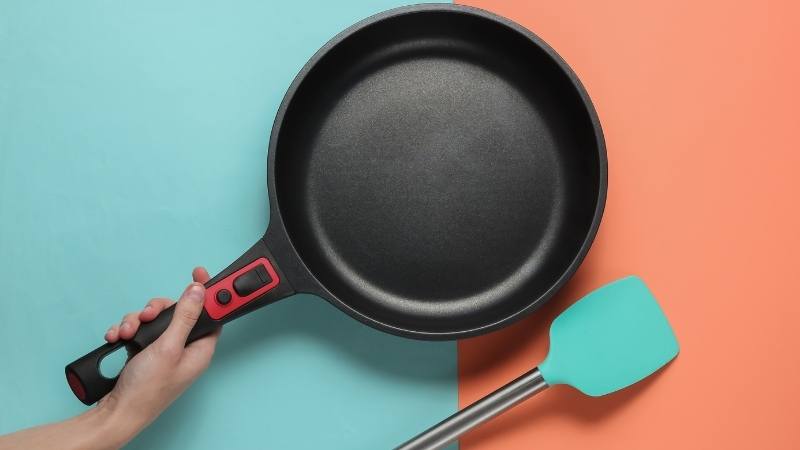Nonstick cookware is a fantastic addition to any kitchen, but incorrect methods to clean, store, and use can damage their nonstick properties faster. Proper care of each nonstick pan is a must to make them long-lasting for years. What could be a better option to cook sautéed veggies, morning omelet, or homemade scrambled eggs, and skillet-cooked chicken than nonstick cookware? Proper care is essential to maintain its surface. There are some rules and the right methods, one should remember while using, cleaning, and storing the nonstick cookware. Below we have shared do's and don’ts lists that will certainly help you to keep them damage-free and long-lasting. Take a look.
After reviewing a horde of pressure cookers, we have zeroed in these best non-stick ones that we consider worthy of your purchase. Keep reading for more.
Cook healthy and delicious food at the comfort of your home in the best non stick cookware India which are the highest quality, finest, induction friendly, and most sought-after products out there.
Follow Instructions Carefully
Brand new nonstick cookware comes along with an instructions manual. It directs you on how to use, clean, and store the pan to prevent wear-off pans or pots. Read and follow each instruction carefully.
Pre-use Season
Ensure you wash all new non-stick cookware with a hot soapy water solution to eliminate any deposition from the packaging. Plus, seasoning non-stick cookware is also essential. It helps to smoothen any uneven or imperfections in the base and coating. Seasoning cookware is relatively easy. You need a spoonful of cooking oil. Now, rub it all over the bottom, and then heat the vessel on low-medium heat for 2-3 minutes. Leave it to cool down. Next, remove any excess oil with a paper towel before storing it into the rack. To lengthen the lifespan of the pan, pre-season and re-season are crucial.
Eliminate Metal Utensils
Unlike other cookware, non-stick cookware needs gentle care.Metal utensils, knives, forks, or any utensil with a sharp point is unsafe to use on non-stick cookware. These utensils can damage the coating layers. Thus, it will drastically decrease the lifespan of your pan. To stir the food, you can use wooden, nylon spoons, and silicone utensils.
Never Use Cooking Spray
It would be good if you avoid cooking spray on non-stick pots and pans. So, if you're using even pure vegetable spray, it will ruin your cookware faster than other wrong methods. It also leaves a residue that ruins the nonstick surface. Apply a small bit of regular oil or self-pump oils to avoid food browning.
Cook on Low or Medium Heat
Cooking on a high flame can deteriorate the nonstick coating layer. How much is not too much? Cooking in nonstick cookware at above the 500ºF temperature breaks down the Teflon and chemical fragments are released. Low to moderate heat is highly advised to cook your food on nonstick cookware. Plus, avoid heating empty pans. It also produces unhealthy fumes.
Temperature Transitions Can Warp Quality
Hasty temperature changes can distort your pan. Avoid washing hot vessels. Washing pans once they get cool down ensure consistent and quality performance. Some high-quality nonstick pans or pots will claim to be safe; however, avoid cleaning a very hot nonstick pan in cold water.
Stack Them Properly
To hang up on a pot rack is the best way to store pans. Ensure pots have good space and keep them away to rub or scratch from sharper things and corners. If you are not in favor of a pot rack, put a napkin or thinner paper towel between each pan and stack them carefully.
Replace Torn Pan
Despite proper care, nonstick cookware lasts around five to six years if it is a high-quality pan. But you should throw the pots immediately if they become pitted or start to peel or lose their non-stick properties.
Avoid Storing Food in a Pan
It is a really bad habit if you store the leftover food in your nonstick pan. Highly acidic food can corrode the nonstick coating of your pan. Be sure to keep the leftover food in containers that are safe to be refrigerated.
Avoid Using Abrasive Cleaning Materials
It's unsafe to use steel wool, stiff bristle brushes, or scouring pads to clean nonstick pots and pans. These can scratch the nonstick layers and it can end up damaging the cookware. If your nonstick pan surface is pitted or the coating is wearing off, it’s best to replace it with the branded new pan. Always use soft sponges or cloths to clean them. If you have stubborn food stuck to your pan, let it soak in water for a few hours to help loosen the hardened bits from the surface before cleaning.

